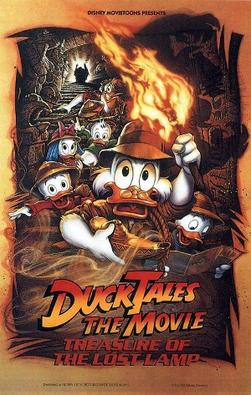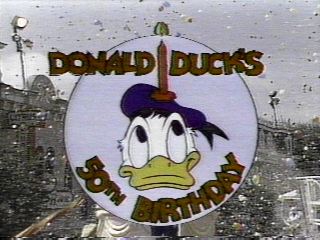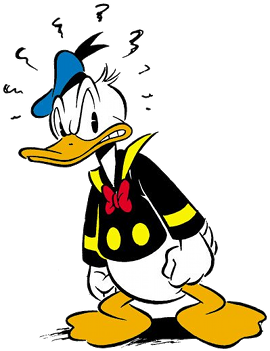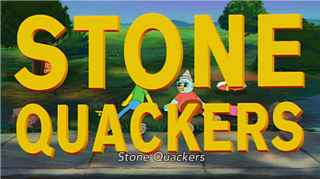
Daisy Duck is an American cartoon character created by the Walt Disney Company. She is an anthropomorphic white duck that has large eyelashes and ruffled tail feathers around her lowest region to suggest a skirt. She is often seen wearing a hair bow, blouse and heeled shoes. The girlfriend of Donald Duck, Daisy was introduced in the short film Mr. Duck Steps Out (1940) and was incorporated into Donald's comic stories several months later. Carl Barks, the screenwriter and lead storyboard artist for the film, was inspired by the 1937 short, Don Donald, that featured a Latin character named Donna Duck, to revive the concept of a female counterpart for Donald.

Huey, Dewey, and Louie are triplet cartoon characters created by storyboard artist (screenwriter) Carl Barks for The Walt Disney Company from an idea proposed by cartoonist Al Taliaferro. They are the nephews of Donald Duck and the grand-nephews of Scrooge McDuck. Like their maternal uncles, the brothers are anthropomorphic white ducks with yellow-orange bills and feet. The boys are sometimes distinguished by the color of their shirts and baseball caps. They appeared in many Donald Duck animated shorts, as well as in the television show DuckTales and its reboot, but the comics remain their primary medium.

Stop motion is an animated filmmaking and special effects technique in which objects are physically manipulated in small increments between individually photographed frames so that they will appear to exhibit independent motion or change when the series of frames is played back. Any kind of object can thus be animated, but puppets with movable joints or plasticine figures are most commonly used. Puppets, models or clay figures built around an armature are used in model animation. Stop motion with live actors is often referred to as pixilation. Stop motion of flat materials such as paper, fabrics or photographs is usually called cutout animation.

Goofy is a cartoon character created by the Walt Disney Company. He is a tall, anthropomorphic dog who typically wears a turtle neck and vest, with pants, shoes, white gloves, and a tall hat originally designed as a rumpled fedora. Goofy is a close friend of Mickey Mouse and Donald Duck, and is Max Goof's father. He is normally characterized as hopelessly clumsy and dim-witted, yet this interpretation is not always definitive; occasionally, Goofy is shown as intuitive and clever, albeit in his own unique, eccentric way.

Duck Amuck is an American animated surreal comedy short film directed by Chuck Jones and written by Michael Maltese. The short was released on January 17, 1953, as part of the Merrie Melodies series, and stars Daffy Duck.

Mickey Mouse Works is an American animated television series produced by Walt Disney Television Animation featuring Mickey Mouse and his friends in a series of animated shorts. The first Disney television animated series to be produced in widescreen high definition, it is formatted as a variety show, with skits starring Mickey Mouse, Minnie Mouse, Donald Duck, Daisy Duck, Goofy, Pluto and Ludwig Von Drake while Horace Horsecollar, Clarabelle Cow, Morty and Ferdie Fieldmouse, Huey, Dewey and Louie, Chip 'n' Dale, Scrooge McDuck, Pete, Humphrey the Bear, J. Audubon Woodlore, Dinah the Dachshund, Butch the Bulldog, Mortimer Mouse, José Carioca, and Clara Cluck appear as supporting or minor characters. Musical themes for each character were composed by Stephen James Taylor with a live 12-piece band and extensive use of the fretless guitar to which the music of the series was nominated for an Annie Award in both 1999 and 2001. Most of the shorts from the series were later used in House of Mouse.

Darkwing Duck is an American animated superhero comedy television series produced by Disney Television Animation that first ran from 1991 to 1992 on both the syndicated programming block The Disney Afternoon and Saturday mornings on ABC. A total of ninety-one episodes were aired. It features the adventures of Darkwing Duck, who is the superheroic alter-ego of ordinary suburban duck Drake Mallard.

Quack Pack is an American animated sitcom produced by Walt Disney Television Animation, featuring Donald Duck and his nephews Huey, Dewey, and Louie. The show debuted on September 3, 1996 as a part of the "Disney Afternoon" programming block, following the success of Goof Troop, and ran for one season with 39 episodes.

DuckTales is an American animated television series produced by Walt Disney Television Animation. It originally premiered on syndication on September 18, 1987, and ran for a total of 100 episodes over four seasons, with its final episode airing on November 28, 1990. Based upon Uncle Scrooge and other Duck universe comic books created by Carl Barks, the show follows Scrooge McDuck, his three grandnephews Huey, Dewey, and Louie, and close friends of the group, on various adventures, most of which either involve seeking out treasure or thwarting the efforts of villains seeking to steal Scrooge's fortune or his Number One Dime.

DuckTales the Movie: Treasure of the Lost Lamp is a 1990 American animated adventure fantasy film based on the animated television series DuckTales and loosely based on the tale of Aladdin and the Wonderful Lamp. Produced and directed by Bob Hathcock and from a screenplay by Alan Burnett, the film features the series' cast of Alan Young, Terrence McGovern, Russi Taylor, and Chuck McCann, with Richard Libertini, Rip Taylor and Christopher Lloyd voicing new characters. The events of the film take place between the third and fourth seasons of DuckTales.

The Wuzzles is an American short-lived animated television series created by Fred Wolf and produced by Disney Television Animation in their first of two productions. The series was broadcast from September 14 to December 7, 1985, on CBS. An idea pitched by Michael Eisner for his new Disney television animation studio, the premise is that the main characters are hybrids of two different animals. The series ran for one season of 13 episodes.

Home Movies is an American animated sitcom created by Brendon Small and Loren Bouchard. The show centers on an eight-year-old aspiring filmmaker, also named Brendon Small, who makes homemade film productions in his spare time with his friends Melissa Robbins and Jason Penopolis. He lives with his divorced mother Paula and his adopted baby sister Josie. He develops a skewed father-son-like relationship with his alcoholic, short-tempered soccer coach, John McGuirk.

Peep and the Big Wide World is an animated children's television series created by Danish-Canadian animator Kaj Pindal. It revolves around the lives of Peep, Chirp, and Quack, as viewers discover, investigate, and explore the world around them.

Queer Duck is an American adult animated web series produced by Icebox.com that originally appeared on the company's website, then later moved to the American cable network Showtime, where it aired following the American version of Queer as Folk. Although far from featuring the first gay cartoon character, Queer Duck was among the first animated series to have homosexuality as its predominant theme.

Katie and Orbie is a Canadian animated television series aimed at preschoolers, originally broadcast in Canada from 1993 to 2003 on Family Channel and later aired in the USA on PBS from 1995 to 1997 and cable television network Disney Channel from 1997 to 2000. In Canada, the series aired uninterruptedly on Family Channel and beginning in 2007, on Disney Junior until December 31, 2012. A total of 78 episodes were produced over six seasons. The series has also aired in different countries around the world.

Tico and Friends is a Japanese anime television series by Nippon Animation. It is about an 11-year-old girl named Nanami Simpson and her best friend Tico, a female orca.

Donald Duck's 50th Birthday is a television special broadcast on The Magical World of Disney on November 13, 1984 on CBS. As the title suggests, it was produced to celebrate the 50th anniversary of the Donald Duck character, who first appeared in the Walt Disney short The Wise Little Hen in 1934.

Donald Duck is a cartoon character created by The Walt Disney Company. Donald is an anthropomorphic white duck with a yellow-orange bill, legs, and feet. He typically wears a sailor shirt and cap with a bow tie. Donald is known for his semi-intelligible speech and his mischievous, temperamental, and pompous personality. Along with his friend Mickey Mouse, Donald was included in TV Guide's list of the 50 greatest cartoon characters of all time in 2002, and has earned a star on the Hollywood Walk of Fame. He has appeared in more films than any other Disney character.

The Wise Quacking Duck is a 1943 Warner Bros. Looney Tunes cartoon directed by Bob Clampett. The cartoon was released on May 1, 1943, and stars Daffy Duck.

Stone Quackers is an American adult animated television series created by Ben Jones. The series premiered October 27, 2014 on FXX as part of their Animation Domination High-Def block.



















